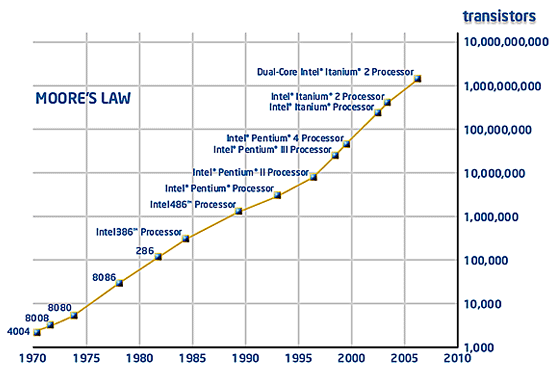For those of you who don't know, Moore's law is a term drscribing the long-term increase in the number of transistors able to be put on an integrated circuit. It increases exponentially and doubles every 12-18 months, all for the same price as the previous. I want to know if there is ever going to be a limit on this? If this continues rising as quickly as it is, we could soon have multiple terabyte iPods that are the size of a quarter. Here is a graph on what it looks like as of 2006. |
|
Results 1 to 24 of 24
Thread: Moore's Law: Is There A Limit?
Threaded View
-
06-21-2010 10:12 PM #1Prone to AWOL Achievements:









- Join Date
- Apr 2010
- LD Count
- ~A lot
- Gender

- Location
- Buffalo
- Posts
- 1,301
- Likes
- 802
- DJ Entries
- 68
Moore's Law: Is There A Limit?
Multiple Induction Technique (MIT) - Consistently have several lucids each night!
2016 TotY: Dragon [ ] Fairy [ ] Unicorn [ ] Gnome [ ] Leprechaun [ ] Phoenix [ ] Chimera [ ]
Similar Threads
-
PM limit.
By Oneironaught in forum Senseless BanterReplies: 95Last Post: 12-16-2007, 05:15 PM




 LinkBack URL
LinkBack URL About LinkBacks
About LinkBacks






 Reply With Quote
Reply With Quote
Bookmarks